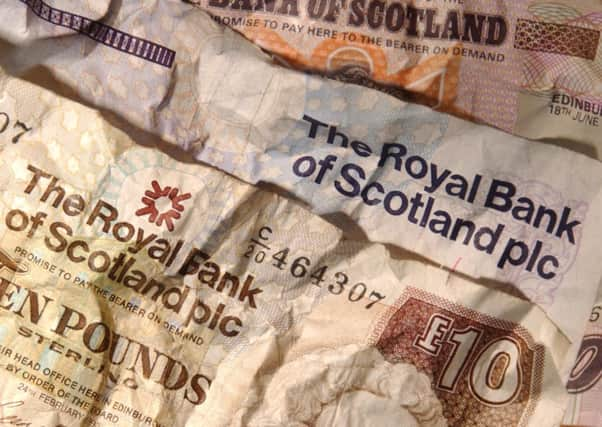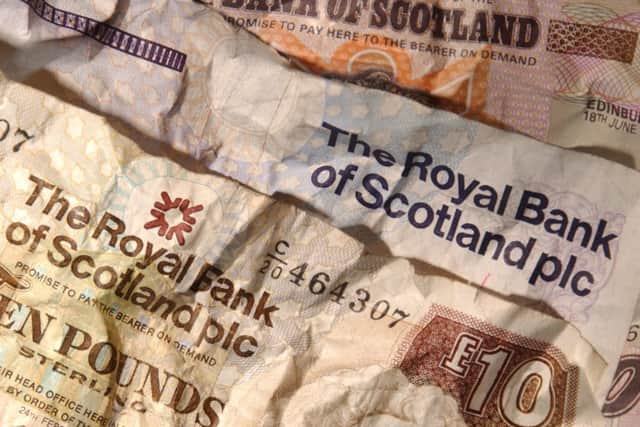Scottish independence: Currency options laid out


The Scottish Government favours a formal monetary union, in which an independent Scotland would continue to share the pound, but this arrangement has been ruled out by Chancellor George Osborne and the main parties at Westminster.
Since Mr Osborne’s statement last month, First Minister Alex Salmond has faced growing calls to set out his “plan B” for currency.
Separate currency backed


Advertisement
Hide AdAdvertisement
Hide AdProfessor Ronald MacDonald, Adam Smith professor of political economy, University of Glasgow, backed a separate currency as the best option.
He told the committee that being part of a formal monetary union would not enable an independent Scotland to deal with the “oil shocks” which come from being a “commodity producer and net exporter of hydro carbons”, which could have “significant knock-on effects for competitiveness of non-oil sector”.
Prof MacDonald said: “Post-independence, the only option I can see for Scotland is a separate currency. Nothing else will work, nothing else will be credible to the markets.”
He went on to tell the committee that a separate currency would be the best option for the rest of the UK too, adding that transaction costs incurred as a result would be “very small relative to the potential costs of a monetary union breaking up”.
Dr Monique Ebell, research fellow at the National Institute of Economic and Social Research, agreed with Prof MacDonald’s views.
She said: “I would agree that the most appropriate currency choice would be for Scotland to have its own currency, mainly because this would give Scotland the greatest capacity to react to shocks.
“This is particularly important given the level of debt an independent Scotland is likely to begin its life as an independent country with.”
Dr Ebell said it would be “difficult to see how a monetary union would be in interests of the rest of UK”.
Advertisement
Hide AdAdvertisement
Hide AdThis view was backed by Sir John Gieve, visiting professor at University College, London.
“I can’t see any real reason why it would be in the rest of the UK’s interests to agree to a formal currency union in anything other than exceptionally controlling terms,” he said.
Sir John said the Scottish Government’s preference for a monetary union was “understandable”.
“It (a formal monetary union) would certainly be optimal to begin with because the economies are very integrated,” he said.
“Over time it is likely to get less optimal and the different weight of oil and gas in particular could make it uncomfortable to have a currency union whose policy will be adapted largely for the rest of the UK.”
Monetary union suggested
In contrast, Professor Anton Muscatelli and Professor Jeremy Peat, director at the David Hume Institute, made the case for a formal monetary union as the best option, with both economists stating a separate currency would be their second choice.
Prof Muscatelli told MSPs he “strongly supported” a monetary union for both an independent Scotland and the rest of the UK.
He reasoned this was “partially about transaction costs, which could be substantial and other costs which cannot easily be estimated”.
Advertisement
Hide AdAdvertisement
Hide AdProf Muscatelli also argued that an oil fund could be used to help “smooth out public expenditure and revenues over time”, solving the “hydro carbon problem” highlighted by Prof MacDonald.
If a monetary union is not negotiated, the second best option is a Scottish currency, he said.
Prof Peat said: “My preference in principle, without doubt, is the currency union, provided that can be achieved on terms which allow sufficient independence of policy action that enables Scotland to look after its own interests in the emerging environment.”
The “only alternative” is a separate currency but this would not be a “soft easy option”, he added.
Prof Peat continued: “I would say so far as a tight fiscal policy is concerned - which means having relatively high taxes and low public finances in order to secure a low or non-existent deficit year on year, and to reduce the debt level relative to GDP over time at a reasonable rate - I think that would probably apply to each of the options.”
Banking risk
The economists also reflected on the consequences of independence for the banking sector in Scotland and the possibility of banks and large corporations “moving” south.
Prof Peat told the committee: “If the head office of RBS or HBoS were to formally move out of Scotland, I am not sure what the loss would be to Scotland in terms of the interests of our economy.
“I would be worried if we didn’t have the competitive financial sector, I would be worried if we didn’t have a sufficient head office base to stimulate those financial and business services.
Advertisement
Hide AdAdvertisement
Hide Ad“But I am not particularly worried if investment banking - casino banking - sticks in London and the risks associated stick in London.
“It would not surprise me in the slightest if there were contingency plans in place for RBS and other financial institutions and significant corporates to move head offices.
“If they look at the risks of staying compared with moving, they may find that is skewed in one direction.”
SEE ALSO: